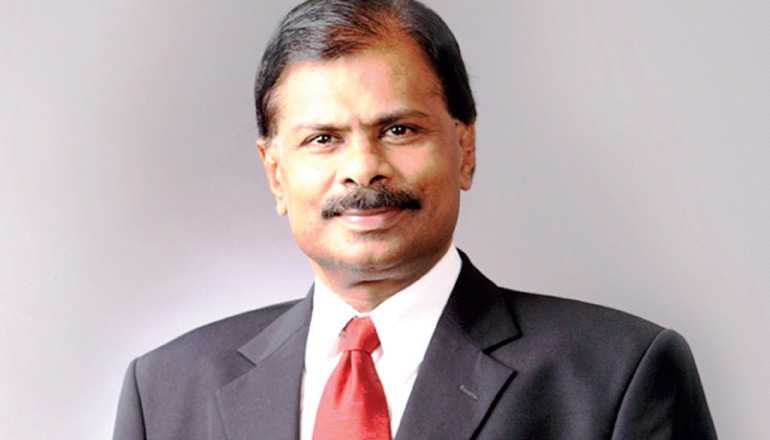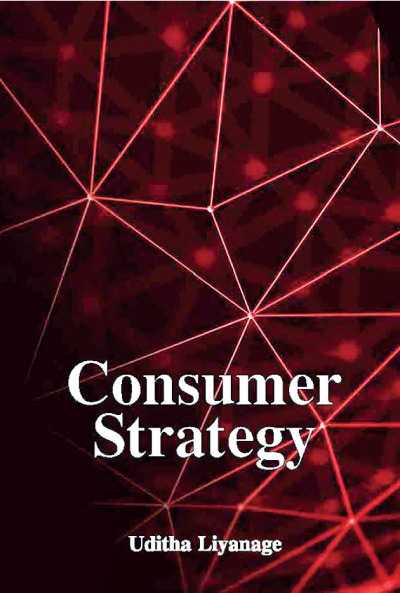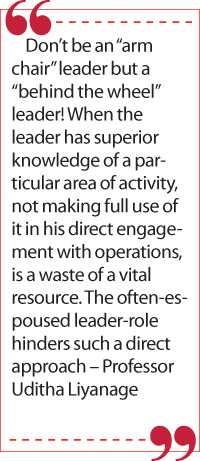Monday Feb 16, 2026
Monday Feb 16, 2026
Monday, 10 August 2020 00:18 - - {{hitsCtrl.values.hits}}

Prof. Uditha Liyanage
Time has passed by. Five years have gone after the sad demise of my mentor. A lot has been said by now about this legendary marketing sage, since his untimely departure in August 2015. The Postgraduate Institute of Management has posthumously published his final contribution, ‘Consumer Strategy’ in 2016. We renamed the PIM library as ‘Prof. Uditha Liyanage Memorial Library’ two years ago. In August, 2019, we launched ‘Prof. Uditha Liyanage Memorial Oration’ as a biennial event. My attempt is not to repeat his accolades but to share my experiences in being influenced by this wonderful human being. Professor Uditha Liyanage was an invaluable instructor, inspirer and an influencer for me. Let me share some such reminiscent memories. 
Overview
I still remember the way the alumni of the Postgraduate Institute of Management (PIMA) together with the Sri Lanka Institute of Marketing (SLIM) and the Chartered Institute of Marketing (CIM) organised an event that revolved around the book, ‘Consumer Strategy’, a collection of articles by
Prof. Liyanage published posthumously.
The 20 articles contained in this volume are all selected by Prof. Uditha Liyanage himself some time ago. They cover a wide range of topics in the broad domain of management, with specific emphasis on marketing and strategy. The depth of conceptual appeal and the breadth of concrete application appear as the hallmark of the veteran author. Variety of valued marketing models developed by Prof. Liyanage is included in this volume, inviting the readers to think afresh, instead of blindly transplanting the western marketing models. Similar is true for strategy as well.
We were keen on launching Consumer Strategy together with a felicitation ceremony for this fascinating human being. Destiny decided otherwise. Nevertheless, Prof. Uditha Liyanage the author will continue to be alive in our minds through his myriad insights. We at PIM committed ourselves in carrying his legacy forward. Publishing of Consumer Strategy and jointly organising an evening event to discuss the contents of it are significant steps in that solid endeavour.
Contents revisited
As it has always been, Prof. Uditha Liyanage invites us not just to read the book, but to recognise the key themes, reflect on the main ideas, relate the concepts covered to the current challenges. It should reinforce the way how one professionally applies the key lessons, in playing a managerial and leadership role in one’s workplace. In essence, knowing should lead to doing and that in turn will deliver results. ‘Consumer Strategy’ essentially revolves around two key themes, viz. consumer and strategy. Among the articles related to consumer aspect in the broad spectrum of marketing, Marketing Strategy and Society: From CSR to SRB is an interesting one. Prof. Liyanage clearly differentiates philanthropy from strategic Corporate Social Responsibility (CSR). We need this clarity, as I saw in the judging process of last National Business Excellence Awards, where there is often confusion between the above two terms.
Among the other insightful papers, “Brand Marketing: From 1P to 6Ps”, “Five Hats of the Consumer”, “Goods – Services Dichotomy: The Place of the Tangibility Construct”, “Towards a Positioning Strategy for Tourism in Post-war Sri Lanka” and “Consumer Behaviour and the Anatomy of a Brand” appear prominently. Also, “Profiling the Sri Lankan Consumer”, “A Customer Value Typology: Beyond the Functional – Emotional Dichotomy” also offer much insights.
Prof. Liyanage’s conceptualisation of “Sri Lanka’s New Mod-tradi Consumer” is indeed an interesting one: “The seemingly opposing socio-cultural forces of traditionalisation and modernisation have to be clearly recognised in our attempt to profile the emerging Sri Lankan-consumer. The force of traditionalisation gathered momentum in the post-1956 period, while the impetus of modernisation was felt particularly in the post-1977 period. Escaping the attention of many, the two forces of traditionalisation and modernisation have been converging, over the recent past, giving rise to the post-modern consumer.” (Liyanage, 2015)
“The harmonisation of the traditionalist and modernist forces gives rise to postmodernist tendencies in the Sri Lankan marketplace”, observed Prof. Liyanage. “A mis-match of the two, produces either an overly traditional, and therefore, an old fashioned and obsolete proposition or a hyped rendering of an overt western and modernist proposition.”
As he further states: “The former lacks appeal in that it may be considered to be desirable, at best, but not necessarily, desired. The latter will be treated, other than by an insignificant minority, as an aberration; as one which lacks relevance and social acceptance.”
“The challenge of today’s marketer is to sense the emerging postmodernist propensities of the emerging consumer and develop propositions and products that avoid the two extremes of being either overly traditionalist or modernist,” says Prof. Liyanage. “Such an endeavour must be based on the recognition of the points of confluence and fusion that appeal to a new breed of postmodern consumers”. “This in turn would be possible only through the deep-going understanding of the psyche and the behaviours of the new and emerging Sri Lankan postmodern consumer,” he concludes.
Strategy focus
Prof. Liyanage gave a new twist to the often hacked term, strategy. His bold arguments are present in the article, “Planning is not Strategy: Big 5 Strategy Questions”.
“Strategy is often confused with planning. The many definitions and delineations of strategy, which highlight one or more aspects of strategy, while ignoring the others, have led to a state of confusion as to what strategy really is. This is evident in the content-analysis of the vision, mission and value statements of a number of companies. Not only were the analysed company – specific statements vague and general, they were also unrelated to one another. Specifically, the espoused values were generic and terminal in nature and unrelated to the tasks and goals at hand.” (Liyanage, 2015)
In order to avoid the confusions in the minds of practitioners, and as reflected in the literature itself, Prof. Liyanage proposes a Strategy Quadrant, consisting of Stand, Standing, Shared values and Supportive Resources and Capabilities,
and Steps.
“Seeing strategy as action is also flawed. “Our strategy is to merge …”, and “….to double our research and development expenditure” are commonplace expressions which tend to pass-off as strategy,” observes Prof. Liyanage. “Putting the planning cart before the strategy horse is a blunder that bedevils many an organisation in its attempt to hone strategic action”, he opines.
In a more applied manner, Prof. Liyanage has elaborated on how strategy execution took place in the battle front. This article is based on the content analysis of two comprehensive post-war presentations made by military experts. The way he compares the adaptation of suitable military strategies to marketing is indeed insightful.
“Don’t be an “arm chair” leader but a “behind the wheel” leader! When the leader has superior knowledge of a particular area of activity, not making full use of it in his direct engagement with operations, is a waste of a vital resource. The often-espoused leader-role hinders such a direct approach.” (Liyanage, 2015)
Among the other interesting articles related to strategy, “The Myth of Pay-for-Performance” and “In Search of Resilience: From Pilot to Architect” also offer salient points to ponder.
“Letting a turbulent environment get the better of you is fraught with the prospect of extinction. Responding to turbulence with resilience is the way forward.
The Darwinian approach of adaptation as reflected in the rebound cycle is natural. Its intent is to get through the crisis and emerge unscathed as far as possible. A more Singarian approach, characterised by an internal locus of control as reflected in a renewal cycle, is to continually renew oneself in order to stay ahead of unfolding patterns and the trajectory of turbulence.” (Liyanage, 2015).
Triple ‘I’s in action
Prof. Uditha Liyanage aptly demonstrated the triple roles of an instructor, inspirer as well as an influencer. He was my marketing teacher at the Postgraduate Institute of Management (PIM). As an engineer who had never done marketing, I developed a flavour for marketing during my MBA studies, thanks to him. The way he generated interest in us not only for the concepts but also for the applications was indeed remarkable. 
He often advocated us to “be brilliant in basics”. The way he delivered a session was much interactive and informative, as he firmly believed in “chalk and talk”. This was the case with numerous topics in Strategic Marketing, Marketing Communication, Consumer Behaviour, Research, Business Strategy and Policy. Of course, he had PowerPoint slides but not with just points but with powerful points. He always challenged us in asking “what is THE point? We had to be clear about the central theme or the main argument.
Prof. Liyanage inspired me in many fronts. He was standing tall in front of all of us. As a sought-after marketing scholar, a strategic management thinker, an exceptional academic, a thought-provoking teacher and a visionary leader, he was a guiding light for us. I saw him rendering yeoman service in multiple ways in raising the PIM flag higher.
“The process of learning and one’s exposure to education must be continuous. There is so much more to be known, and that which you know may no longer be valid.” This had been Prof. Liyanage’s advice. He shared with us articles, web-links and books that are of high relevance to sharpening the managerial skills. I still remember how he shared the article on “Nishkam Karma (detached involvement) written by a Prof. Chakraborty from Indian Institute of Management, Bangalore. Prof. Liyanage was much interested in knowing my reflections on it, and it took time for me to realise the value of such gestures. Moreover, I see the immense value of detached involvement as a leader, thanks to him.
I saw the blossoming of transformational leadership at PIM with Prof. Liyanage. He influenced all of us to raise the quality and relevance of all modules we deliver. “Our business is mastery”, he often uttered. “PIM brings the reward of outstanding results to those professional managers who strive towards mastery.” That’s how he influenced the aspiring learners of PIM.
Way forward
Life is not only to live but to leave a legacy. Prof. Liyanage has aptly done that in his knowledge creating and knowledge sharing life. “In order to succeed, people need a sense of self-efficacy, to struggle together with resilience to meet the inevitable obstacles and inequities of life”, so said Albert Bandura, the most admired living psychologist of our times. This was very true of Prof. Liyanage.
He had a purpose to live and it was indeed a purpose-driven life. His thoughts will spark our minds for a long time. He strived to make PIM a centre of management excellence, as the management sage of our age. We at PIM commit ourselves to carry his legacy forward. I am humbly happy to lead a learning community in such a noble endeavour.
(Prof. Ajantha Dharmasiri can be reached through [email protected], [email protected] or www.ajanthadharmasiri.info.)